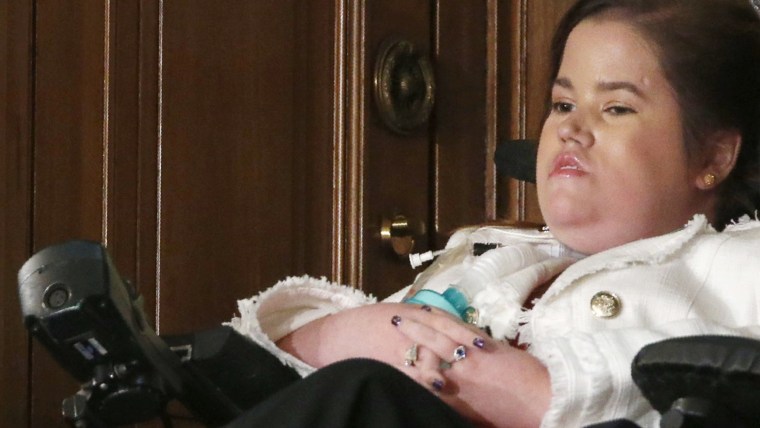During his address to Congress last night, President Donald Trump introduced Megan Crowley, a 20-year-old woman with a rare disease.
Crowley, who has a neuromuscular disorder known as Pompe disease, credits her survival to her father's small biotechnology company for developing and producing a therapy for the rare genetic mutation.
During the speech, the President suggested that Crowley’s story highlighted the need to scale back regulations and to streamline the processes of the Food and Drug Administration. While Crowley's doctor welcomed the spotlight shown on Pompe disease and on rare diseases, in general, others cautioned that rushing experimental treatments through the Food and Drug Administration could have disastrous results.
Related: Speed up drug approvals? The FDA already did
The big problem isn’t with the FDA’s procedures, but rather a shortage of funds and the small numbers of people in whom scientists can study the ailments, researcher Dr. Puneet Opal told TODAY.
FDA drug approval procedures are intended to prevent patient deaths from experimental treatments, said Opal, a professor of neurology at Northwestern University’s Feinberg School of Medicine.
"You do need the FDA to be the police dog," said Opal.
Crowley’s physician, Dr. Priya Sunil Kishnani, division chief of medical genetics at the Duke University Medical Center, was excited to have rare diseases given such high-profile attention.
“We diagnosed Megan at Duke in 1998 when she was just 15 months old. It’s been an amazing journey to see how she has not just survived but is thriving despite her limitations,” Kishnani, who is also professor of pediatrics and division chief of medical genetics, told TODAY.
Pompe disease occurs in an estimated 1 in 12,000 to 20,000 babies and people with an adult-onset form, according to Duke University experts. Crowley's father’s struggle to find a cure for the disease was profiled in the book “The Cure: How a Father Raised $100 Million — and Bucked the Medical Establishment — in a Quest to Save His Children” and also inspired a 2010 movie called “Extraordinary Measures.”

Related: Parents race to save girl with rare, deadly disease
For those not familiar with Pompe, here are five things to know:
1. It’s caused by a recessive gene.
That means that a child must inherit two copies — one from each parent — to be affected by it. Children born with just one copy of the mutated gene are healthy and generally are completely unaware they have it.
2. It affects the muscles.
When someone has both copies of the mutated gene, the body lacks enough of an enzyme that breaks down the starch glycogen into glucose, a form of sugar that fuels the muscles. The result is a damaging overabundance of glycogen.
“Because the heart is also a muscle, damage to it is what generally kills patients even before there is respiratory distress,” Opal said.
2. Symptoms often appear in infancy.
In babies, the earliest symptoms are “not meeting motor milestones,” Kishnani said. Babies might not hold their heads up or start rolling over at the expected age. They may not have the same strength as other babies of similar age.
"When you pick them up you feel like they’re almost slipping through your fingers," said Kishnani.
Respiratory symptoms or pneumonia might reveal a massively enlarged heart.
3. Severity depends on the mutation.
The severity of the symptoms and when they appear depend on the exact type of mutation. There are children who show up with worse symptoms than Crowley and others who show up with milder ones, Kishnani said.
4. There is no cure.
The treatment isn’t a cure for the disease, but it is lifesaving. Crowley is confined to a wheelchair and must use a ventilator to breathe.
5. It doesn't affect the mind.
“These individuals do have a life," said Kishnani, talking about Megan's spunk and passion.
"She has life goals. People should not just look past her ... and think there are not going to be any cognitive abilities.”